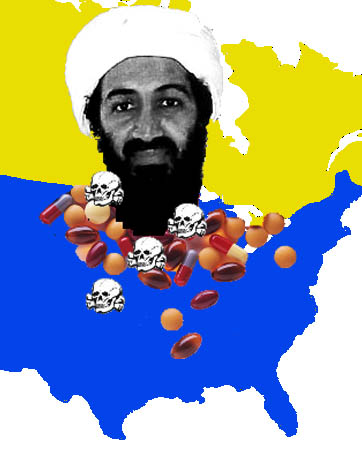
Crawford’s remarks may strike some as politically motivated and Brian Roehrkasse, spokesman for the Homeland Security Department responded to Crawford’s remarks by saying “While we must assume that such a threat exists generally, we have no specific information now about any al-Qaida threats to our food or drug supply.”
For the complete OpEd piece, see “Drug Importation Crisis: Terror Politics to the Rescue!“
Obviously, the FDA did not have credibility, even among other government agencies. PhRMA (the Pharmaceutical Research & Manufacturers Association), which represents more than two dozen of the world’s top pharmaceutical firms, recently solicited the aid of someone who’s credibility with regard to terrorism is unparalleled (even if he does lack certain moral values such as fidelity to his wife). That person, of course, is former New York City Mayor Rudy Giuliani.
PhRMA commissioned Guiliani Partners to produce a report that called for an immediate moratorium on drug importation legislation (see PhRMA press release: “Giuliani Report Calls for Immediate Moratorium On Drug Importation Legislation.“
Credible Sources
According to Giuliani, “opening U.S. borders to prescription drugs could provide an unfortunate opportunity for terrorists. Several credible sources have identified links between counterfeit goods, including pharmaceuticals, and organized criminals and terrorist groups,” he said. ”It is not difficult to imagine a scenario in which terrorist groups could use this system to either finance operations or, worse, as a vehicle of attack.”
These “credible sources” may be of the same ilk that gave us Iraq’s weapons of mass destruction. I can “imagine” many scenarios of terrorists using our “systems” to attack us. How about our food distribution “system?” Tommy Thompson, the former Secretary of Health and Human Services, suggested this threat as he was leaving his office one day. “For the life of me,” said Thompson, “I cannot understand why the terrorists have not attacked our food supply because it is so easy to do.” (See “Thompson resigns with grim warning“) Want to worry about something? Worry about that!
If fear mongering can get us to war in Iraq, it surely can also be useful for other political purposes! And it is all about politics, protecting the drug industry against consumer choice, not about protecting consumers. Else wouldn’t we be reading a Guiliani report about terrorist threats to our food supply system?
Let’s not try to win every policy argument by bringing terrorism into the equation. I think it undermines our vigilance against real terror threats. Remember the moral of Aesop’s fable about the little shepherd boy:
There is no believing a liar, even when he speaks the truth.









![6 Digital Tools at the Center of Healthcare Digitalization [INFOGRAPHIC]](http://ec2-54-175-84-28.compute-1.amazonaws.com/pharma-mkting.com/wp-content/uploads/2021/04/6DigitalTools_600px-100x70.jpg)




